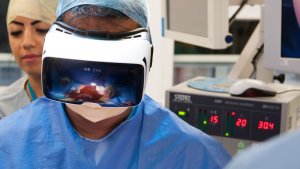Healthcare is an industry that is on the forefront of emerging technologies that provide ease of access to patients. With all of the recent upgrades to medical equipment that provide assistance to doctors and nurses during procedures, virtual reality is looking to make the experience for patients smoother and easier to access.

The progress that virtual reality has had in the healthcare industry has been tremendous, and the impact it will have in the future will continue to grow. By 2017, Markets and Markets reported that the VR healthcare market had grown to $976 million from $525 million in 2012. And, according to Grand View Research, the VR and Augmented Reality (AR) healthcare industry will be $5.1 billion by 2025. This is why VR Health, an Israeli based company, has teamed up with Oculus to implement virtual reality within hospitals across the United States, ranging from Stanford Sports Medicine to Mass General Hospital.
One of the main reasons why virtual reality has become popular in the healthcare industry is because it has allowed the patients to receive treatments or be able to conduct a full assessment with a doctor remotely. If a patient were to simply put on a VR device in the comfort of their home, they would be instantly be able to communicate with their doctor and avoid the hassle of waiting in line just for a check up. They could also conduct physical therapy on these devices as instructions will be sent on the screen and the patient will follow in suit. On the surface this sounds like a great idea but there are some instant concerns that enter my mind. The first one would be how the hospital would be able to monitor the security of patient’s information through the VR device, as well as comply with HIPPA standards. Another concern that entered my mind would be what kind of meeting with the doctor would this work with. Would this only work with normal checkups, or more specific meetings that need more attention in person.
This technology can also expand beyond the hospital scene and into the distribution of pharmaceuticals as well. One of my assignments during my internship at AmerisourceBergen was to research more about virtual reality and how we could implement that into the network of pharmacies that partner with us. One idea that I came up with was to implement virtual reality into the consumption of medicine for patients who need more help with the process, or for individuals who have never done it before. They could place a virtual reality device in each pharmacy to demonstrate how that specific medicine that each person is receiving is administered correctly. This could increase drug adherence and provide guidance on how often the drug should be taken.
Virtual Reality is here for the future, and it has a direct impact in the healthcare industry. It’s going to be interesting to see where this heads in the future.
Source: https://www.forbes.com/sites/jenniferhicks/2018/09/30/see-how-this-company-uses-virtual-reality-to-change-patient-healthcare/#3eabdd5b455e
Leave a Reply